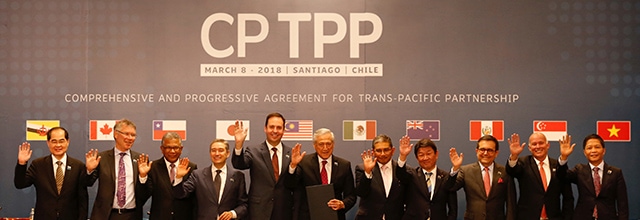U.S. President Donald Trump's withdrawal from the Trans-Pacific Partnership prompted the other 11 nations that were party to the agreement to forge ahead in a new pact without the U.S.

When Donald Trump made withdrawal from the Trans-Pacific Partnership (TPP) a key part of his election campaign, many wondered whether the trade deal had any future without the US. The answer came on March 8 in Santiago, Chile, when a revised version of the original pact, called Comprehensive and Progressive Agreement for Trans-Pacific Partnership (CPTPP or TPP-11) was signed by eleven nations that represent roughly 40% of the world’s economic output. Australia, Brunei, Canada, Chile, Japan, Malaysia, Mexico, New Zealand, Peru, Singapore and Vietnam will slash more than 98% of tariffs, establishing a trade zone with a combined GDP of $13.7 trillion.
While free-trade advocates can claim an historic win, the credibility of the US was badly bruised. The pact, had it included the world’s biggest economy, would have comprised a collective population of 800 million—almost double that of the EU’s single market. Most importantly, the US missed the chance to strengthen its position in the Asia-Pacific region. “Initially, it was the US who promoted this agreement—some would say in a move to counterbalance China’s influence in Asia and other Latin American countries. At the end, the agreement was signed without the US, whereas China has expressed interest in joining,” says Lourdes Casanova, director of the Emerging Markets Institute at the Johnson School of Business at Cornell University. “We seem to be moving from multilateral trade agreements to bilateral trade agreements between nations. It is ironic that the champion of ‘free trade’ is moving in the opposite direction.”
Casanova calls it an illustration of a “new trade paradigm” now in effect, and others see a sea change in global trade policy. “The Trump administration’s trade policies are leaving the US increasingly isolated on the global stage,” says Thomas Sampson, professor at Centre for Economic Performance of the London School of Economics. “The CPTPP agreement shows other countries are willing to push forward and reach new deals even without US leadership.”
Sophal Ear, professor of diplomacy and world affairs at Occidental College in Los Angeles, notes that the pact could absorb the US, should it change course under a new administration. Still, “the damage is done, and it will take a long time and a lot of effort to undo, if that’s even possible. Building trust takes a lot of work, destroying it is easy.”
It was almost ironic, some observers pointed out, that just minutes after the trade ministers gathered in Santiago shook hands on their partnership, president Trump followed announced new tariffs on steel and aluminum, seen by many as the first protectionist salvos in a possible global trade war. Ear is among them: “I don’t think this is just a minor disruption. This is going to last beyond Trump. It’s wise to expect the worst, or at least prepare for it”.



